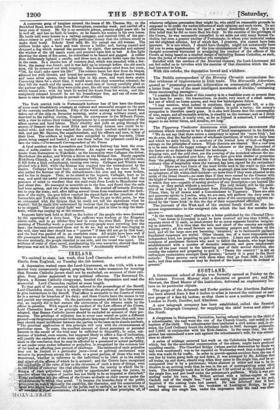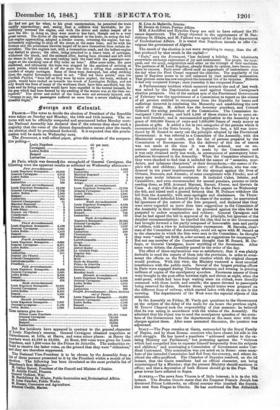S C OTL AND.
A Government school of design was formally opened at Paisley on the 4th instant. Provost Murray read a discourse on general art; and Mr. Stewart, the Head Master of the institution, delivered an explanatory lec- ture on its particular objects.
The gauge of the Arbroath and Forfar portion of the Aberdeen Railway has been altered from 5 feet 6 inches to what is termed the national or nar- row gauge of 4 feet inches; so that there is now a uniform gunge from London to Perth, Dundee, and Aberdeen.
A new telegraph company has been established, called the Scottish Electric Telegraph Company, for supplying the chief towns and cities of the North.
A clergyman in Blairgowrie, Perthshire, having refused baptism to the child of a schoolmaster, the case went the run of the Church Courts, and ended in the baptism of the child. The schoolmaster then instituted a civil action: and, in ab- sence, the Lord Ordinary found the defendant liable to 5001. damages personally, and 1,500/ in conjunction with his Kirk-Session. In the mean time, the cler gyman has commenced a new suit against the schoolmaster's wife, for non-attend- ance at church. A series of mishaps occurred last week on the Caledonian Railway; some of which, but for the accidental counteraction of the others, might have produced appalling results. The Crawford Bridge (whose partial destruction by floods we last week mentioned) was so far repaired on Wednesday week that a single line of rails was made fit for traffic. In order to provide against accident from the use of one line by trains going both up and down, it was arranged by Mr. Addison that all trains, up and down, should stop when they came to the single line, and be ac- companied over it by a pointsman; whose absence at either end was to be in- dicative to an arriving train that he was in the act of accompanying some other train. The Edinburgh train due in Carlisle at 7.30 arrived at the Scottish end of the single line, and put itself under the pointsman's guidance. While it was pro- ceeding under his care, Mr. Willett arrived with a ballast-engine at the Carlisle end of the single line, "and not seeing the informed that it had; and being anxious to join the workmen at Lamington Bridge, he pro- ceeded along the single line, under the impression that the road was clear. He had not got far when, to his great consternation, he perceived the train rapidly approaching; and, seeing that a collision was inevitable, he im- mediately reversed the engine, and with the driver and stoker leaped off to save his life: in doing so, they were more or less hurt, though not to a very great extent. The driver of the engine attached to the train, on seeing the bal- last-engine approaching, adopted a similar course, reversing the engine, but un- fortunately neglecting to shut off the steam at the same time; and he with his fireman and the pointsman likewise leaped off to save themselves from certain de- struction. The two engines met, with a tremendous crash, and the ballast-engine was dashed to pieces; the other, being attached to a heavy train of carriages, withstood the shock, and the moment after, having been reversed and left with the steam in full play, was seen rushing back the road with the passenger-car- riages at the alarming rate of fifty miles an hour.' After some miles, the pace slackened, and ultimately the train was stopped by the accident of arriving at some points, which turned it off the main line into a siding that contained, a number of empty carriages. Some of these were destroyed, but after striking them the engine fortunately ceased to act. "Had not these points," says the Carlisle Patriot, "been left as they were by some neglect, the train, without a guide, would have rushed on towards the wreck of Lamington Bridge, and not only would the lives of many of the workmen there have been sacrificed, but the train and its living contents would have been engulfed in the torrent beneath, for the gap which bad been formed by the swelling of the waters was at the time un- repaired? The driver and stoker of the tram were not seriously injured, and, "strange to say, the passengers suffered no more than a severe shaking and a dreadful fright."



























 Previous page
Previous page